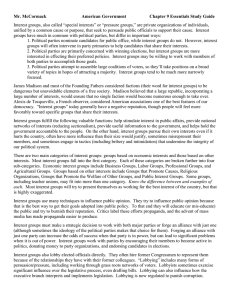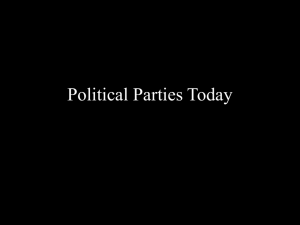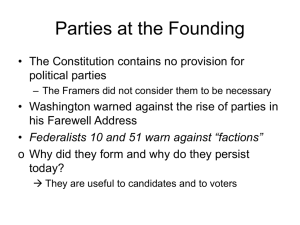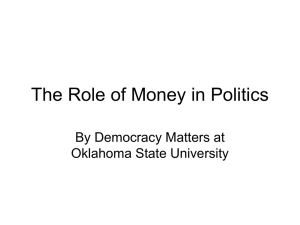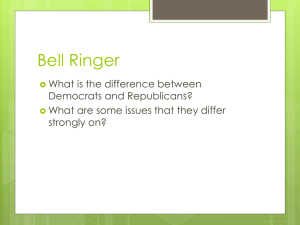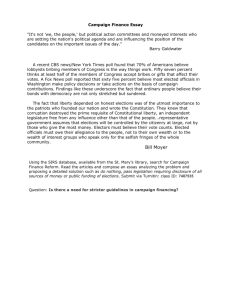mass media
advertisement
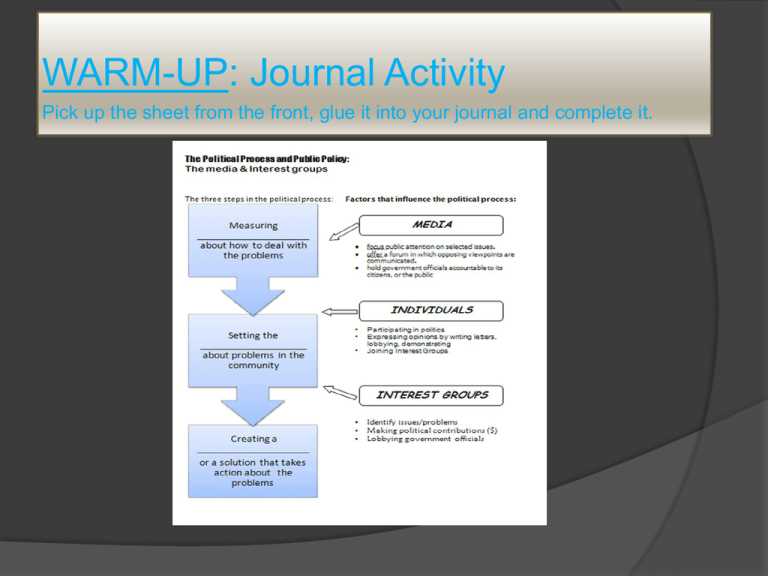
WARM-UP: Journal Activity Pick up the sheet from the front, glue it into your journal and complete it. Preview- under your warm-up, number your paper 1-8 Answer true or false to the following statements “The media” only refers to television. 2) The media decides which stories to air. 3) Biased means favoring one view over another. 4) Bias can affect what stories a media source decides are important. 5) An issue can’t get on the public agenda if nobody has heard about it. 6) Everyone agrees the media should play a role in setting the public agenda. 7) If you watch the news, you will hear about all the issues that exist. 8) In its role as watchdog, the media identifies candidates and government problems. 1) OBJECTIVES CONTENT OBJECTIVE How does the mass media influence the political process? LANGUAGE OBJECTIVE We will read, complete an interactive computer activity and take notes. The Political Process with… Vocabulary Check- Make an “X” by each word MASS MEDIA Mass communication sources available for public useboth print and electronic PROPAGANDA Ideas that may involve misleading messages to manipulate people EDITORIAL A news article expressing the view of the editor or publisher OP-ED An essay in a newspaper or magazine that gives the opinion of the writer CAMPAIGN An organized effort to advertise in order to gain support to win an elected position BIAS To give unfair support to one side (favoritism) A public meeting used for open discussion on politics FORUM Reading: “The Role of the Mass Media” pages 48-49 Read and highlight key ideas. Answer questions 11-13. The mass media in the United States plays an important role in our political process. Mass media are forms of communication that are created to reach large audiences. They include TV, radio, newspapers, national magazines, books, and the Internet. Mass media play different roles in elections. These include: identifying candidates emphasizing selected issues broadcasting different points of view writing editorials, creating political cartoons and publishing op-ed pieces. Op-ed pieces are pieces of writing that express the opinions of columnists and guest writers. They appear on the page opposite the editorial page in our newspapers, thus the name op-ed. This increase in mass media makes it necessary for voters to evaluate the information presented in political campaigns so that they can make informed choices about the candidates and the issues. Some strategies for evaluating the accuracy of campaign speeches, literature, and advertisements include separating fact from opinion, evaluating the reliability of information sources, detecting bias, and identifying propaganda. To evaluate the reliability of an information source, voters must ask themselves a number of questions. For example, voters must decide if the source is trustworthy and informed about the information it is sharing. They must also find out where the source got its information and if the information is accurate and current, or up to date. Bias is the distorting of an event or observation due to a person’s opinion or feelings about the event or observation. In politics, mass media information may be biased to support or not support a particular candidate or issue. In order to detect bias, voters need to determine what the author’s or speaker’s political position is, who is paying for the message, what sources were used, and whether different viewpoints were shared. Propaganda is the spreading of information for the purpose of influencing the opinions of others. Mass media enables propaganda to be spread quickly to huge audiences. Because of this, citizens need to be able to recognize it in its many forms There are also many ways media play an important role in setting the public agenda. They focus public attention on selected issues. They offer a forum in which opposing viewpoints are communicated. Whereas they hold government officials accountable to its citizens, or the public, government officials also use the media to communicate with the public. Campaigns and the Mass MediaPage 59 Essential Question- How does the mass media influence the political process and elections? President Obama giving a Press conference in the White House Notes Political Parties work hard to campaign and get their members elected into office Where do the voters get information about the candidates and issues in a campaign? (write this as a question in your left hand column) What role does the Mass Media have in elections? Individuals the mass media What role does the mass media play in elections? (Graphic organizer notes) iewpoints of both sides are broadcast Forums include- debates, TV, radio, newspaper, Internet Task Card http://wtvr.com/2014/10/1 4/during-debate-virginiasenate-candidates-sparover-number-of-issues/ 1. Click on the link about the Virginia Senate race between Warner and Gillespie. 2. After watching, answer question #1 on the task card dentify the candidates and hold them accountable to the public In advertisements, commercials and news stories Task Card http://news.yahoo.com/vi deo/gov-christie-talksobama-39151138089.html 1. Click on the link about holding President Obama accountable to the public about ISIS 2. After watching, answer question #2 on the task card mphasize selected issues to focus public attention Identify problems, topics, daily news reports Task Card http://www.foxnews.com/ opinion/2014/10/13/ebola -fumble-what-cdc-needsto-do-now/ 1. Click on the link about holding President Obama battling the Ebola virus 2. After watching, answer question #3 on the task card rite and publish editorials, political cartoons, op-ed pieces to show opposing opinions Try to influence the reader Task Card 1. Study each of the images above about Obamacare. 2. Answer question #4 on the task card The Mass Media can emphasize certain candidates, political parties, issues or opinions to try to change your opinion about them. How can voters make informed choices then in elections? Evaluating Campaign Ads The public must evaluate (judge) campaign speeches, literature and advertisements for the truth (accuracy). (write this as a question in the left hand column) How can the public evaluate the media? Individuals have to decide which to take 1. Separate fact from opinion FactCan it be proven? CE.5c OpinionIs it how someone feels? Task Card http://www.youtube.com/ watch?v=qZWHDzbEBno 1. Click on the link about John Foust for Virginia Congress 2. After watching, answer question #5 on the task card 2. Identifying propaganda . Is the information exaggerated? CE.5c Task Card http://www.youtube.com/ watch?v=3BdI_a6qwx4 1. Click on the link about the Virginia congressional race between Comstock and Foust 2. After watching, answer question #6 on the task card 3- Detect bias CE.5c Is the source only showing one side? Task Card 1. Study this image from the 2012 presidential campaign. 2. Answer question #7 on the task card. 4. Evaluate the source Is the source reliable? CE.5c Task Card 1. Study this images debating whether or not President Obama is a born citizen. 2. Answer question #8 on the task card Exit Ticket-Go back to your preview answers and answer these questions again. Did you change some answers? “The media” only refers to television. 2) The media decides which stories to air. 3) Biased means favoring one view over another. 4) Bias can affect what stories a media source decides are important. 5) An issue can’t get on the public agenda if nobody has heard about it. 6) Everyone agrees the media should play a role in setting the public agenda. 7) If you watch the new, you will hear about all the issues that exist. 8) In its role as watchdog, the media identifies candidates and government problems. 1) Summary Write a summary at the bottom of the page. So what? What is important to understand about this? CE.5c Candidates for political office generally do a great deal of advertising. Which of the following is NOT a reason for candidates to advertise? a. accurately show their position on issues b. seek campaign donations c. influence voters d. become wealthy CE.5c D CE.5c Which of the following can have the most impact on a political election? a. the church b. the mass media c. political action committees d. campaign speeches CE.5c B CE.5c To evaluate advertisements accurately, people must… a. use the scientific method. b. separate fact from opinion. c. read the newspaper every day. d. watch many news programs. CE.5c B CE.5c Propaganda 1.What is propaganda? 2. Where do you see it? Endorsements (testimonials) Definition Support from wellknown people Examples Celebrities Athletes Popular people Stacked Cards Definition Showing only one side of an issue Examples Numbers Smiling Meaningless Name-calling (mudslinging) Definition Attacking an opponent Examples Negative “attack”ads Symbolism Definition Popular symbols to appeal to the public Examples Patriotic Emotional (babies) Just Plain Folk Definition Appeal to the average voter Examples Uses everyday people Quick, easy message Bandwagon Definition Convince people that everyone agrees Examples Popular beliefs Popular figures Other interesting commercials Johnson 1964 Kennedy 1960 Bush Olympics I Like Ike
